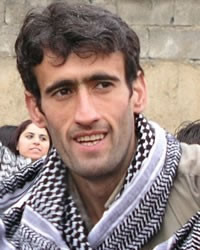Kurd, Kurmanji in Kazakhstan

Photo Source:
manothegreek
|
Send Joshua Project a map of this people group.
|
| People Name: | Kurd, Kurmanji |
| Country: | Kazakhstan |
| 10/40 Window: | Yes |
| Population: | 54,000 |
| World Population: | 16,544,400 |
| Primary Language: | Kurdish, Northern |
| Primary Religion: | Islam |
| Christian Adherents: | 0.30 % |
| Evangelicals: | 0.10 % |
| Scripture: | Complete Bible |
| Ministry Resources: | Yes |
| Jesus Film: | Yes |
| Audio Recordings: | Yes |
| People Cluster: | Kurd |
| Affinity Bloc: | Persian-Median |
| Progress Level: |
|
Introduction / History
The Kurds are one of the largest ethno-linguistic people group in the world without their own nation. The homeland of the Kurds is in the Middle East, northwestern Iran, southeastern Turkey and the northern sections of Iraq and Syria. Some were deported to Kazakhstan during WWII by Soviet dictator Josef Stalin who mistakenly thought the Kurds were helping the Nazis. After WWII Kurds migrated to other parts of the world, but thousands remain in Kazakhstan. More Kurds migrated to Kazakhstan from Armenia during the 1988 war between Armenia and Azerbaijan.
Some Kurds in Kazakhstan speak Kazakh at home while others still speak Northern Kurdish or Kurmanji. Almost all also speak Russian which is helpful in their business contacts.
What Are Their Lives Like?
Kurds living in the former Soviet countries like Kazakhstan are among the most prosperous citizens. They face little or no discrimination, and many even hold high political offices, work as professionals and own large businesses. They enjoy the use of utilities, roads, housing, and medical facilities that would be considered "luxurious" in their homeland of Kurdistan. The traditional occupation of the Northern Kurds in their homeland was that of nomadic herding of goats and sheep. In Kazakhstan, they have had to take on new jobs such as construction, owning restaurants and businesses. Kurdish parents encourage their boys and girls to obtain a college education.
Family is an essential part of Northern Kurdish culture. The relationship between family members is close. The clan and community are more important than the individual in traditional Kurdish society. The Kurdish father is the traditional head of the home. The groom's family must pay a bride price to the relatives of the bride because she becomes officially part of the groom's family after the wedding. Traditionally a Kurdish man and woman in love could not marry without both their families' permission.
A Northern Kurdish woman is not considered an adult unless she is married and had children. Kurdish women and girls are raised to dress modestly. Dressing immodestly would dishonor her family. Northern Kurds tend to live in nuclear families. Respecting older people is integral part of Kurdish culture. Hospitality and family honor are significant features of the Kurds no matter where they live.
What Are Their Beliefs?
About 75% of the world's Kurds claim to be Sunni Muslims. Smaller Kurdish groups include Shia, Sufi, Christian and Yazidi. Sunni Kurds try to obey the teachings of the Koran and the prophet Mohammad. They believe that by following the Five Pillars of Islam that they will attain heaven when they die. However, Allah, the supreme God of the universe, determines who enters paradise. Sunnis pray five times a day facing Mecca. They fast the month of Ramadan. They attend mosque services on Friday. If a Muslim has the means, he or she will make a pilgrimage to Mecca once in his or her lifetime. Muslims are also prohibited to drink alcohol, eat pork, gamble, steal, use deceit, slander, and make idols. The two main holidays for Sunni Muslims are Eid al Fitr, the breaking of the monthly fast and Eid al Adha, the celebration of Abraham's willingness to sacrifice his son to Allah. The Kurdish New Year on March 21 is celebrated as a major holiday by all Kurds regardless of religion.
What Are Their Needs?
Many Northern Kurds are herders. They live in remote parts of Kazakhstan where they do not have adequate medical care.
Prayer Points
Pray the Lord leads believers to build friendship with Northern Kurds in Kazakhstan and tell them about their Savior. Pray that God creates a hunger for the Bible and spiritual truth in the heart of the Kurdish people living in Kazakhstan. Ask God to raise up Northern Kurds in Kazakhstan who will make more disciples. Pray that Kurdish leaders are willing to investigate the claims of Jesus Christ.
Pray the Lord leads believers to build friendships with Northern Kurds and tell them about their Savior. Pray that God creates a hunger for the Bible and spiritual truth in the heart of the Kurdish people.